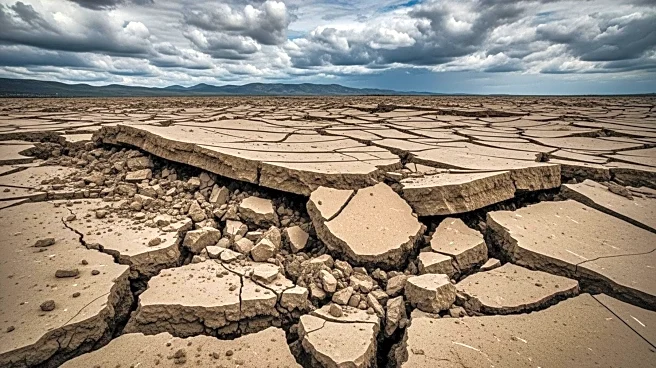What's Happening?
A devastating earthquake struck Afghanistan, resulting in hundreds of deaths and thousands of injuries. The epicenter of the quake was located approximately 17 miles east of Jalalabad, near the border with Pakistan. The impact of the earthquake has been severe, with significant loss of life and widespread injuries reported. Emergency response teams are currently engaged in rescue operations, attempting to reach affected areas and provide necessary aid to survivors. The earthquake has caused substantial damage to infrastructure, complicating relief efforts and posing challenges to the delivery of medical and humanitarian assistance.
Why It's Important?
The earthquake in Afghanistan highlights the vulnerability of regions prone to seismic activity and the urgent need for effective disaster preparedness and response mechanisms. The humanitarian impact is profound, with thousands of individuals affected, requiring immediate medical care, shelter, and support. The disaster underscores the importance of international aid and cooperation in addressing the needs of affected populations. It also raises concerns about the resilience of infrastructure in earthquake-prone areas and the necessity for investment in building structures that can withstand such natural disasters. The event may prompt discussions on improving regional disaster management strategies and enhancing global support for affected communities.
What's Next?
In the aftermath of the earthquake, Afghanistan is likely to seek international assistance to manage the crisis and support recovery efforts. Humanitarian organizations and governments may mobilize resources to provide aid and relief to the affected regions. The focus will be on delivering medical supplies, food, and shelter to those in need, as well as restoring essential services disrupted by the earthquake. Long-term recovery plans may involve rebuilding infrastructure and implementing measures to mitigate future risks. The international community's response and the effectiveness of aid delivery will be crucial in determining the pace of recovery and the restoration of normalcy in the affected areas.
Beyond the Headlines
The earthquake in Afghanistan may have broader implications for regional stability and security. The disaster could exacerbate existing challenges faced by the country, including political instability and economic difficulties. It may also impact cross-border relations with neighboring countries, particularly Pakistan, as both nations deal with the consequences of the earthquake. Additionally, the event could influence global discussions on climate change and environmental resilience, emphasizing the need for sustainable development practices that consider natural disaster risks. The situation may also highlight ethical considerations regarding the equitable distribution of aid and the prioritization of vulnerable populations in disaster response efforts.










